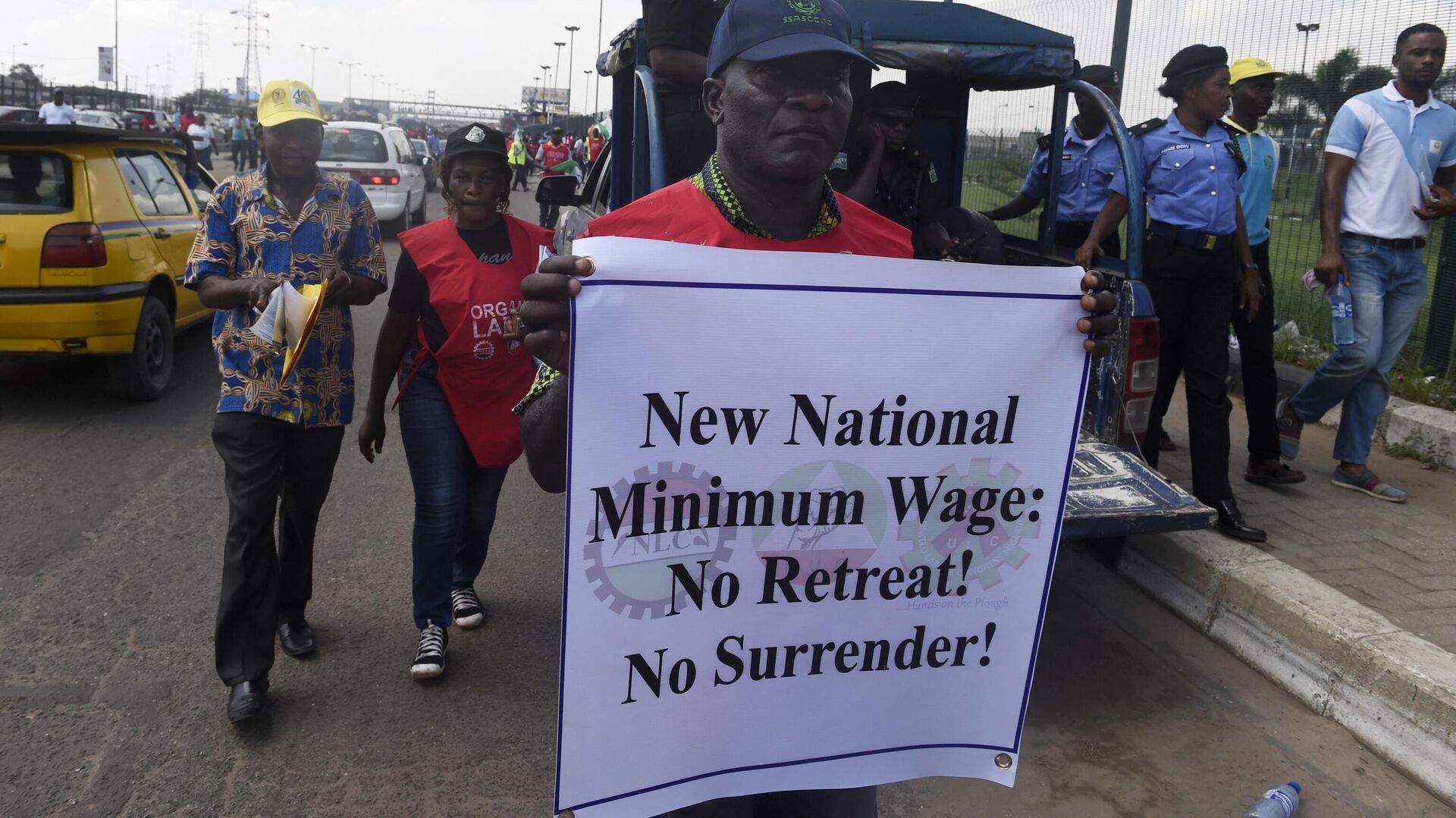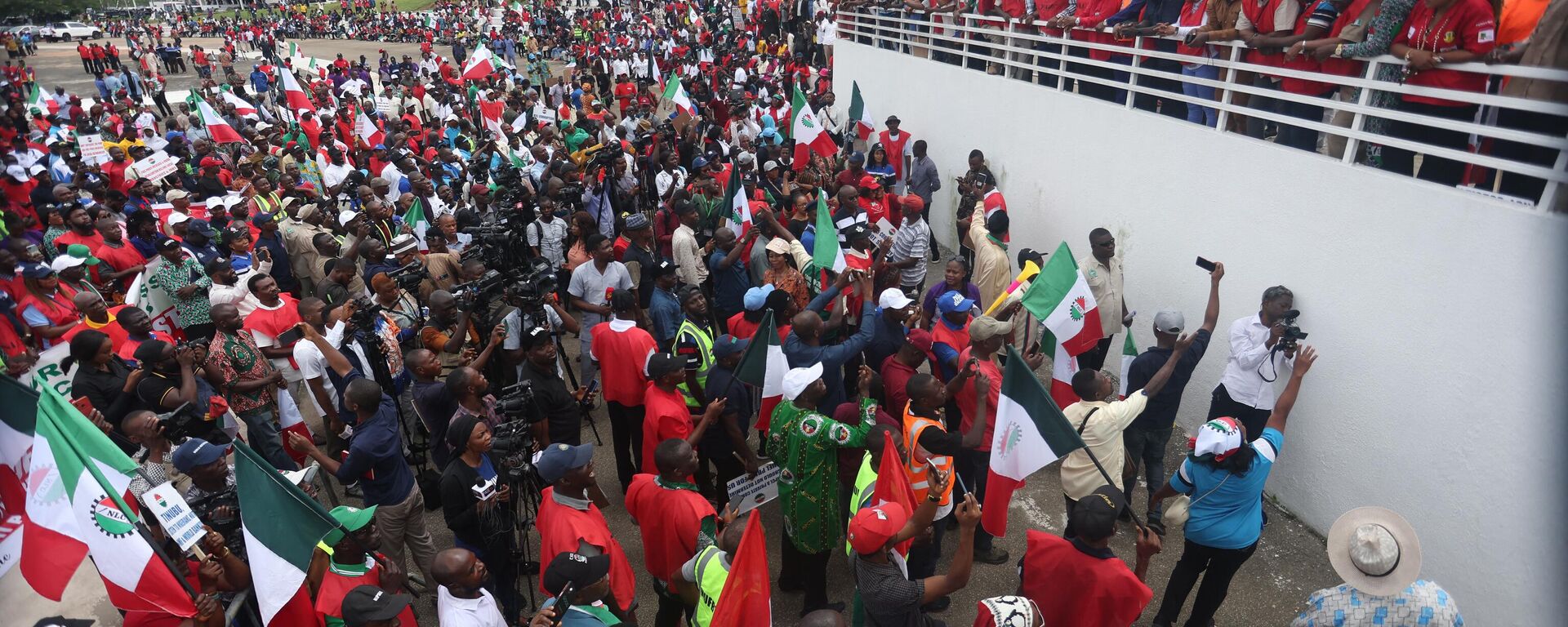https://en.sputniknews.africa/20240602/nigerian-workers-indefinite-strike-to-raise-minimum-wage-begins-on-sunday-1066840878.html
Nigerian Workers' 'Indefinite' Strike to Raise Minimum Wage Begins on Sunday
Nigerian Workers' 'Indefinite' Strike to Raise Minimum Wage Begins on Sunday
Sputnik Africa
From 1981 (when the minimum wage was legislated at 125 naira/month) to 2019, the minimum wage in Nigeria changed three times. In 2000, it was increased to... 02.06.2024, Sputnik Africa
2024-06-02T12:15+0200
2024-06-02T12:15+0200
2024-06-03T10:58+0200
nigeria
sub-saharan africa
west africa
bola tinubu
united nations (un)
economy
reforms
poverty
petroleum
minimum wage
https://cdn1.img.sputniknews.africa/img/07e8/06/02/1066841210_0:321:3071:2048_1920x0_80_0_0_689c3bba06a9ed3a0cb285acd0fc9e57.jpg
In Nigeria, an indefinite strike begins on Sunday after labor unions failed to agree on a new minimum wage with the government, the Nigeria Labor Congress (NLC) and Trades Union Congress (TUC) announced on Friday.In its account X, the NLC published statements from unions supporting the strike, including Nigeria Union of Petroleum and Natural Gas Workers, National Union of Electricity Employees, Judiciary Staff Union of Nigeria, and more.The country's two largest unions said on May 1 that they would stop working if a new minimum wage was not agreed upon by the end of May.In Friday's statement, the unions also said that the government officials failed to attend a meeting on Friday to address the matter after the unions' rejection of a previous plan.The NLC and TUC have declared that the strike will continue until the implementation of a new minimum wage. In addition, they requested the reversal of a recent increase in power tariffs.In April, the electricity regulator raised charges for better-off consumers who use the highest amount of electricity as part of the government's efforts to reduce subsidies and alleviate strain on public budgets.Since assuming office a bit over a year ago, Nigeria's President Bola Tinubu has implemented extensive changes. These reforms include reducing expensive petrol and power subsidies, as well as depreciating the naira currency twice in the span of a year to decrease the difference between the official and parallel market exchange rates.The changes, which led to a significant increase in petrol prices and also resulted in a substantial increase in the cost of living, are largely opposed by labor unions.
https://en.sputniknews.africa/20231007/workers-in-nigeria-face-continued-economic-hardship-despite-new-financial-assistance-1062599083.html
nigeria
west africa
Sputnik Africa
feedback@sputniknews.com
+74956456601
MIA „Rossiya Segodnya“
2024
Christina Glazkova
https://cdn1.img.sputniknews.africa/img/07e7/0b/07/1063380906_0:0:673:674_100x100_80_0_0_79628b4d0cd9f29291a57aa13bbf9e7a.jpg
Christina Glazkova
https://cdn1.img.sputniknews.africa/img/07e7/0b/07/1063380906_0:0:673:674_100x100_80_0_0_79628b4d0cd9f29291a57aa13bbf9e7a.jpg
News
en_EN
Sputnik Africa
feedback@sputniknews.com
+74956456601
MIA „Rossiya Segodnya“
Sputnik Africa
feedback@sputniknews.com
+74956456601
MIA „Rossiya Segodnya“
Christina Glazkova
https://cdn1.img.sputniknews.africa/img/07e7/0b/07/1063380906_0:0:673:674_100x100_80_0_0_79628b4d0cd9f29291a57aa13bbf9e7a.jpg
nigeria, west africa, bola tinubu, united nations (un), economy, reforms, poverty, petroleum, minimum wage
nigeria, west africa, bola tinubu, united nations (un), economy, reforms, poverty, petroleum, minimum wage
Nigerian Workers' 'Indefinite' Strike to Raise Minimum Wage Begins on Sunday
12:15 02.06.2024 (Updated: 10:58 03.06.2024) Christina Glazkova
Writer / Editor
From 1981 (when the minimum wage was legislated at 125 naira/month) to 2019, the minimum wage in Nigeria changed three times. In 2000, it was increased to 5,500 naira, in 2011 to 18,000 naira, and in 2019 to 30,000 naira ($22.45). The latter is still less than the international poverty line defined by the UN at $2.15/hour (or about $64.5/month).
In Nigeria, an indefinite strike begins on Sunday after labor unions failed to agree on a new minimum wage with the government, the Nigeria Labor Congress (NLC) and Trades Union Congress (TUC)
announced on Friday.
"Government [...] refused to do [...] more, not even a kobo was added to the 60,000 naira [about $45] that they proposed on Tuesday, and we rightly rejected," the unions said in a statement.
In its account X, the NLC published statements from unions supporting the strike, including
Nigeria Union of Petroleum and Natural Gas Workers, National Union of Electricity Employees, Judiciary Staff Union of Nigeria, and more.
The country's two largest unions said on May 1 that they would stop working if a
new minimum wage was not agreed upon by the end of May.
In Friday's statement, the unions also said that the government officials failed to attend a meeting on Friday to address the matter after the unions' rejection of a previous plan.
The NLC and TUC have declared that the strike will continue until the implementation of a new minimum wage. In addition, they requested the reversal of a recent increase in power tariffs.
In April, the
electricity regulator raised charges for better-off consumers who use the highest amount of electricity as part of the government's efforts to reduce subsidies and alleviate strain on public budgets.
Since assuming office a bit over a year ago, Nigeria's President
Bola Tinubu has implemented extensive changes. These reforms include reducing expensive
petrol and power subsidies, as well as depreciating the naira currency twice in the span of a year to decrease the difference between the official and parallel market exchange rates.
The changes, which led to a significant increase in petrol prices and also resulted in a substantial increase in the cost of living, are largely opposed by labor unions.



